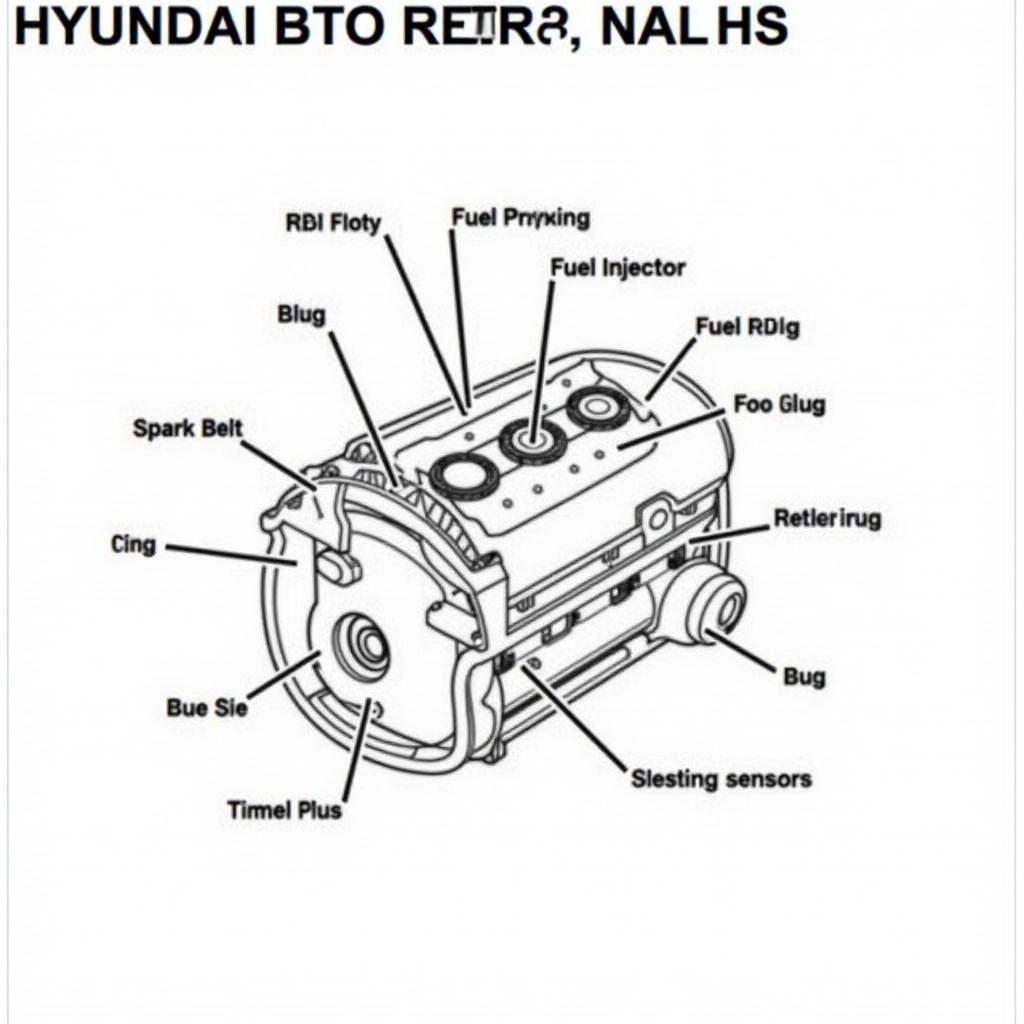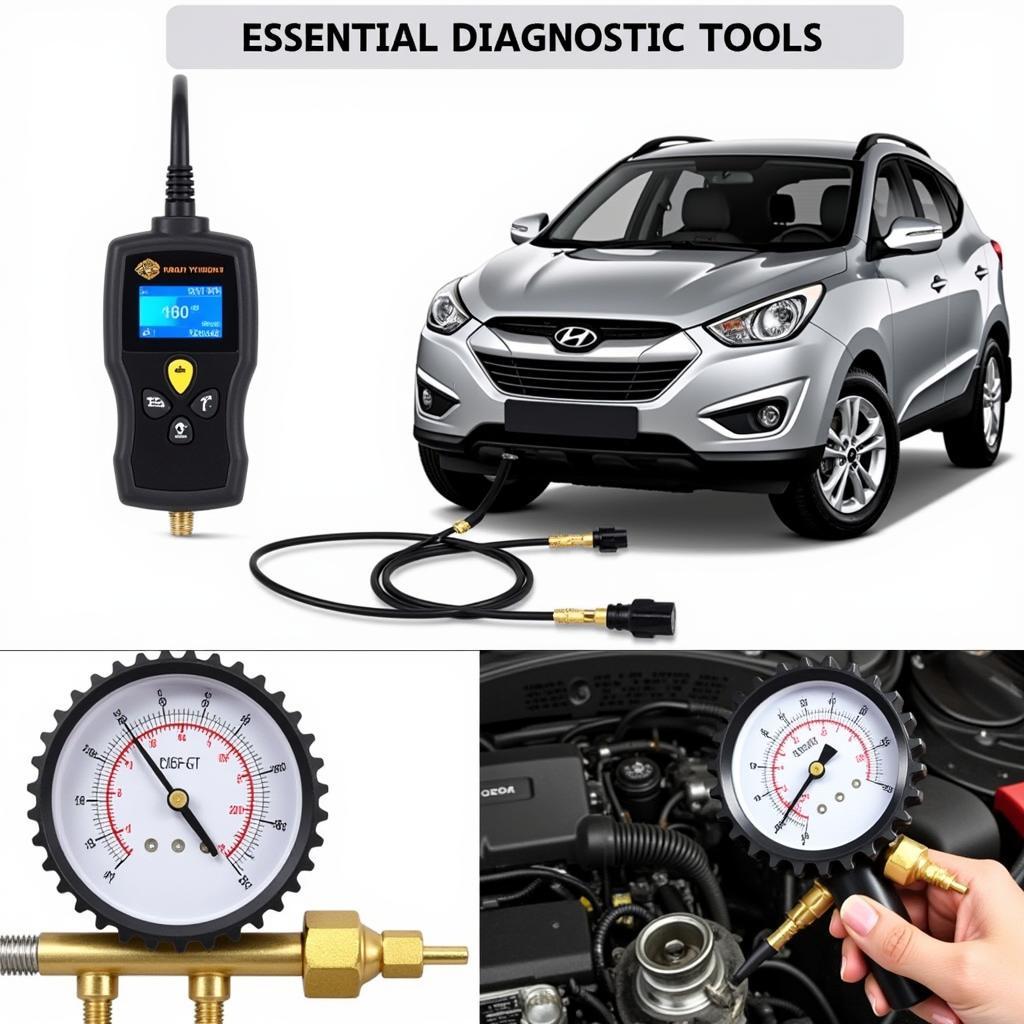Hyundai vehicles are known for their reliability and value. However, like any car, they can experience engine problems. This guide provides a comprehensive overview of common Hyundai Car Engine Problems, offering troubleshooting tips and repair advice for car owners, mechanics, and technicians.
Understanding Common Hyundai Car Engine Problems
Several factors can contribute to Hyundai engine problems, ranging from simple maintenance issues to more complex mechanical failures. Recognizing the symptoms and understanding the potential causes is crucial for effective troubleshooting.
Common Symptoms of Hyundai Engine Trouble
Some common indicators of Hyundai engine problems include:
- Check Engine Light: This warning light can illuminate for various reasons, including engine misfires, sensor malfunctions, or emissions issues.
- Reduced Fuel Economy: A noticeable drop in miles per gallon can suggest problems with the fuel system, ignition system, or engine itself.
- Rough Idle: If your Hyundai’s engine vibrates excessively or runs unevenly at idle, it could indicate issues with spark plugs, fuel injectors, or vacuum leaks.
- Loss of Power: A decrease in acceleration or difficulty maintaining speed can be a sign of serious engine problems, such as low compression or a failing fuel pump.
- Unusual Noises: Knocking, ticking, or whining sounds coming from the engine compartment should be investigated promptly.
Similar to car stalls idle problems, these issues can significantly affect the drivability and performance of your vehicle. It is crucial to address them quickly.
Potential Causes of Hyundai Engine Problems
Several potential causes can lead to these symptoms:
- Faulty Spark Plugs: Worn or damaged spark plugs can cause misfires, leading to reduced performance and fuel economy.
- Clogged Fuel Injectors: Dirty or clogged fuel injectors can disrupt the fuel delivery process, resulting in rough idling and loss of power.
- Vacuum Leaks: Leaks in the intake manifold or vacuum hoses can affect the engine’s air-fuel mixture, causing rough idling and performance issues.
- Low Compression: Low compression in one or more cylinders can significantly reduce engine power and efficiency. This can be caused by worn piston rings, damaged valves, or a blown head gasket.
- Sensor Malfunctions: Faulty sensors, such as the oxygen sensor or mass airflow sensor, can provide incorrect information to the engine control unit (ECU), leading to various performance problems.
- Timing Belt Issues: A worn or broken timing belt can cause significant engine damage, potentially requiring a complete engine rebuild.
 Key Components of a Hyundai Engine: Spark Plugs, Fuel Injectors, and Timing Belt
Key Components of a Hyundai Engine: Spark Plugs, Fuel Injectors, and Timing Belt
Troubleshooting Hyundai Engine Problems
When faced with Hyundai car engine problems, the following troubleshooting steps can help identify the root cause:
- Check the Check Engine Light: Use an OBD-II scanner to retrieve the trouble codes stored in the ECU. These codes can provide valuable clues about the nature of the problem.
- Inspect the Spark Plugs: Remove and inspect the spark plugs for signs of wear or damage. Replace them if necessary.
- Check for Vacuum Leaks: Inspect the intake manifold and vacuum hoses for cracks or leaks. Use a vacuum gauge to test for leaks if needed.
- Test the Fuel Injectors: Have the fuel injectors professionally tested to ensure they are functioning correctly.
Just like troubleshooting car problem squealing cold engine, a systematic approach is key to diagnosing the issue accurately.
 Essential Diagnostic Tools for Hyundai Engine Troubleshooting: OBD-II Scanner and Vacuum Gauge
Essential Diagnostic Tools for Hyundai Engine Troubleshooting: OBD-II Scanner and Vacuum Gauge
Repairing Hyundai Engine Problems
Depending on the severity of the issue, repairs can range from simple DIY fixes to more complex procedures requiring professional assistance. For some models, specific issues may arise, such as the 2016 hyundai accent car problems. While some minor repairs can be handled by experienced DIYers, more complex problems often necessitate the expertise of a qualified mechanic.
When to Seek Professional Help
It’s essential to seek professional help if:
- The problem persists after basic troubleshooting.
- The engine is making unusual noises.
- The check engine light remains illuminated after repairs.
- You lack the tools or expertise to perform the necessary repairs.
For specific issues like those affecting the 2006 hyundai santa fe problem the car keep it running, consulting a specialist is often the best course of action. Understanding which cars have oil dilution problem can also be helpful in preventing future issues.
Conclusion
Hyundai car engine problems can range from minor inconveniences to major mechanical failures. By understanding the common symptoms, potential causes, and troubleshooting steps, you can effectively address these issues and keep your Hyundai running smoothly. If you encounter complex problems or lack the necessary expertise, it’s always best to consult a qualified mechanic. For further assistance or personalized guidance, connect with AutoTipPro at +1 (641) 206-8880 or visit our office at 500 N St Mary’s St, San Antonio, TX 78205, United States.
FAQ
- What is the most common Hyundai engine problem? Issues with the Theta II engine, specifically related to engine knocking and seizing, have been reported in some Hyundai models.
- How can I prevent Hyundai engine problems? Regular maintenance, including oil changes, spark plug replacements, and timing belt inspections, can help prevent many engine problems.
- How much does it cost to repair a Hyundai engine? The cost of engine repair varies depending on the severity of the problem and the specific model.
- Can I drive my Hyundai with the check engine light on? While it’s possible to drive with the check engine light on, it’s essential to have the problem diagnosed and repaired as soon as possible.
- What is the warranty on a Hyundai engine? Hyundai offers a 10-year/100,000-mile powertrain warranty on most models.
- How do I know if my Hyundai needs a new engine? Signs of a failing engine include low compression, excessive oil consumption, and persistent knocking noises.
- What should I do if my Hyundai engine overheats? Pull over immediately and turn off the engine. Allow the engine to cool down before checking the coolant level.






Leave a Reply